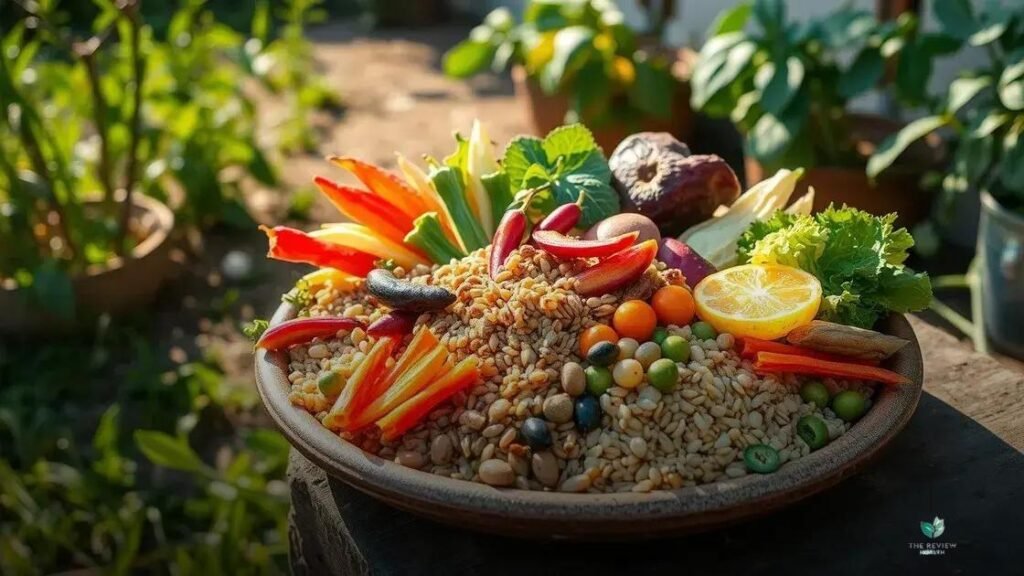A sustainable diet, rich in plant-based foods, supports mental well-being by providing essential nutrients for brain health, fostering a healthy gut microbiome, and reducing environmental impact, leading to improved mood and cognitive function.
Have you ever considered how a sustainable diet could impact your mental well-being? Adopting eco-friendly nutrition not only nourishes your body but also supports emotional health. Let’s dive into the benefits of sustainable eating and how it can transform your daily life.
The connection between sustainable diet and mental health

The connection between a sustainable diet and mental health is a growing area of research, revealing intricate links between what we eat and how we feel. Sustainable diets, rich in plant-based foods like fruits, vegetables, and whole grains, are often packed with nutrients that support brain health. These nutrient-dense foods provide essential vitamins, minerals, and antioxidants that protect against oxidative stress and inflammation, both of which are implicated in mental health conditions.
The Gut-Brain Axis
A key player in this connection is the gut-brain axis, a complex communication network between the gut microbiome and the brain. A sustainable diet, rich in fiber and diverse plant-based foods, fosters a healthy gut microbiome. This balanced gut environment can positively influence neurotransmitter production, such as serotonin, often called the “happy hormone,” which plays a crucial role in mood regulation.
Reducing Environmental Impact, Improving Mental Well-being
Beyond the direct impact on our bodies, adopting a sustainable diet can also contribute to a sense of purpose and well-being by reducing our environmental footprint. Knowing that our food choices are helping the planet can lessen feelings of eco-anxiety and promote a more positive outlook. This holistic approach to health, considering both personal and planetary well-being, can lead to improved mental resilience and overall life satisfaction.
Research suggests that diets high in processed foods, sugar, and unhealthy fats can negatively affect mental health. By shifting towards a sustainable diet, we can nourish both our minds and bodies, paving the way for improved mood, reduced anxiety, and enhanced cognitive function. This connection highlights the importance of food as medicine and the potential of sustainable eating to support long-term mental well-being.
Best sustainable foods for boosting mental well-being

When it comes to boosting mental well-being through a sustainable diet, choosing the right foods is key. Nutrient-rich options are the foundation of a healthy mind and body. Here are some of the best sustainable foods that can contribute to improved mental health:
Leafy Greens and Colorful Vegetables
Leafy greens like spinach and kale, along with colorful vegetables such as bell peppers and carrots, are packed with vitamins, minerals, and antioxidants that support brain health. They provide essential nutrients like folate and vitamin K, which play a role in cognitive function and mood regulation.
Nuts and Seeds
Nuts and seeds are excellent sources of healthy fats, fiber, and plant-based protein. These nutrients are crucial for brain health and can help stabilize mood and energy levels. Walnuts, almonds, chia seeds, and flaxseeds are particularly beneficial.
Legumes
Lentils, beans, and chickpeas are sustainable protein sources that also provide fiber and essential minerals. They contribute to stable blood sugar levels, which can help prevent mood swings and improve focus.
Whole Grains
Whole grains like oats, quinoa, and brown rice provide sustained energy and are rich in B vitamins, which are essential for nerve function and mood regulation. Choosing whole grains over refined grains helps support overall mental well-being.
Fruits
Berries, in particular, are rich in antioxidants that protect the brain from oxidative stress. Other fruits like bananas and oranges provide essential vitamins and minerals that support overall health and contribute to a balanced mood.
By incorporating these sustainable foods into your diet, you can provide your brain with the nutrients it needs to thrive. Remember that a balanced and varied diet is key to maximizing the mental health benefits of sustainable eating.
How to start a sustainable eating routine

Transitioning to a sustainable eating routine doesn’t have to be overwhelming. It’s about making gradual changes that you can stick with long-term. Here’s a practical guide to get you started:
Start Small and Plan Ahead
Begin by incorporating one or two sustainable food swaps into your weekly meals. For example, try replacing meat with legumes once a week or choosing locally sourced produce. Meal planning is essential for success. Plan your meals for the week, create a grocery list, and stick to it. This helps reduce food waste and ensures you have sustainable options readily available.
Cook More Often
Cooking at home gives you complete control over ingredients and helps you avoid processed foods, which are often less sustainable. Start with simple recipes and gradually experiment with new plant-based dishes. This allows you to explore new flavors and become more comfortable with sustainable cooking.
Embrace Seasonal Eating
Eating seasonally supports local farmers and reduces the environmental impact of transporting food long distances. Visit farmers markets or join a Community Supported Agriculture (CSA) program to access fresh, seasonal produce. This connects you directly with the source of your food and encourages sustainable practices.
Reduce Food Waste
Food waste is a significant contributor to environmental problems. Plan your meals carefully, store food properly, and get creative with leftovers to minimize waste. Composting food scraps is another great way to reduce your environmental impact.
Make it a Lifestyle
Sustainable eating is not a diet; it’s a lifestyle choice. Focus on making gradual, sustainable changes that you can maintain over time. Be patient with yourself and celebrate small victories along the way. This approach will help you build lasting habits and contribute to a healthier planet and a healthier you.
Making Sustainable Choices for a Healthier You and a Healthier Planet
Adopting a sustainable diet is not just about what you eat; it’s about making conscious choices that benefit both your mental well-being and the environment. By embracing sustainable eating habits, you’re investing in a healthier, happier you and contributing to a more sustainable future for all. Start small, experiment with new foods, and enjoy the journey towards a more balanced and fulfilling lifestyle.
FAQ: Your Questions About Sustainable Diets and Mental Well-being
What is a sustainable diet?
A sustainable diet is one that is good for both your health and the environment. It focuses on plant-based foods, reduces meat consumption, minimizes processed foods, and prioritizes locally sourced and seasonal ingredients.
How can a sustainable diet improve my mental health?
Sustainable diets are often rich in nutrients that support brain health, such as vitamins, minerals, and antioxidants. A healthy gut microbiome, fostered by a sustainable diet, can also positively influence mood and cognitive function.
What are some easy ways to start eating more sustainably?
Start small by incorporating one or two sustainable food swaps into your meals each week. Try Meatless Mondays or buying locally sourced produce. Planning your meals and reducing food waste are also key steps.
Is a sustainable diet expensive?
Not necessarily. Focusing on whole foods like beans, lentils, and seasonal produce can be very affordable. Reducing meat consumption and minimizing processed foods can also save money.
What are the environmental benefits of a sustainable diet?
Sustainable diets reduce greenhouse gas emissions, conserve water, protect biodiversity, and minimize deforestation. By making conscious food choices, you can contribute to a healthier planet.
Where can I find more information about sustainable eating?
There are many online resources and books available that provide information and tips on sustainable eating. Local farmers’ markets and community gardens are also great places to learn more.

Sarah Thompson is a passionate advocate for healthy living and mindful lifestyle choices. With a background in nutrition science and years of experience as a wellness coach, Sarah dedicates her time to exploring the latest trends, research, and products that promote physical, mental, and emotional well-being.
As the lead writer for The Review Health , Sarah combines her expertise with a genuine love for helping others make informed decisions about their health. Her articles are designed to inspire and educate, offering practical tips, honest reviews, and science-backed insights to support readers on their journey to a healthier, happier life.
When she’s not writing or researching, Sarah enjoys yoga, experimenting with plant-based recipes, and spending time outdoors with her family.



